
Heating System Check: Prepare Your Home for Winter
September 24, 2025
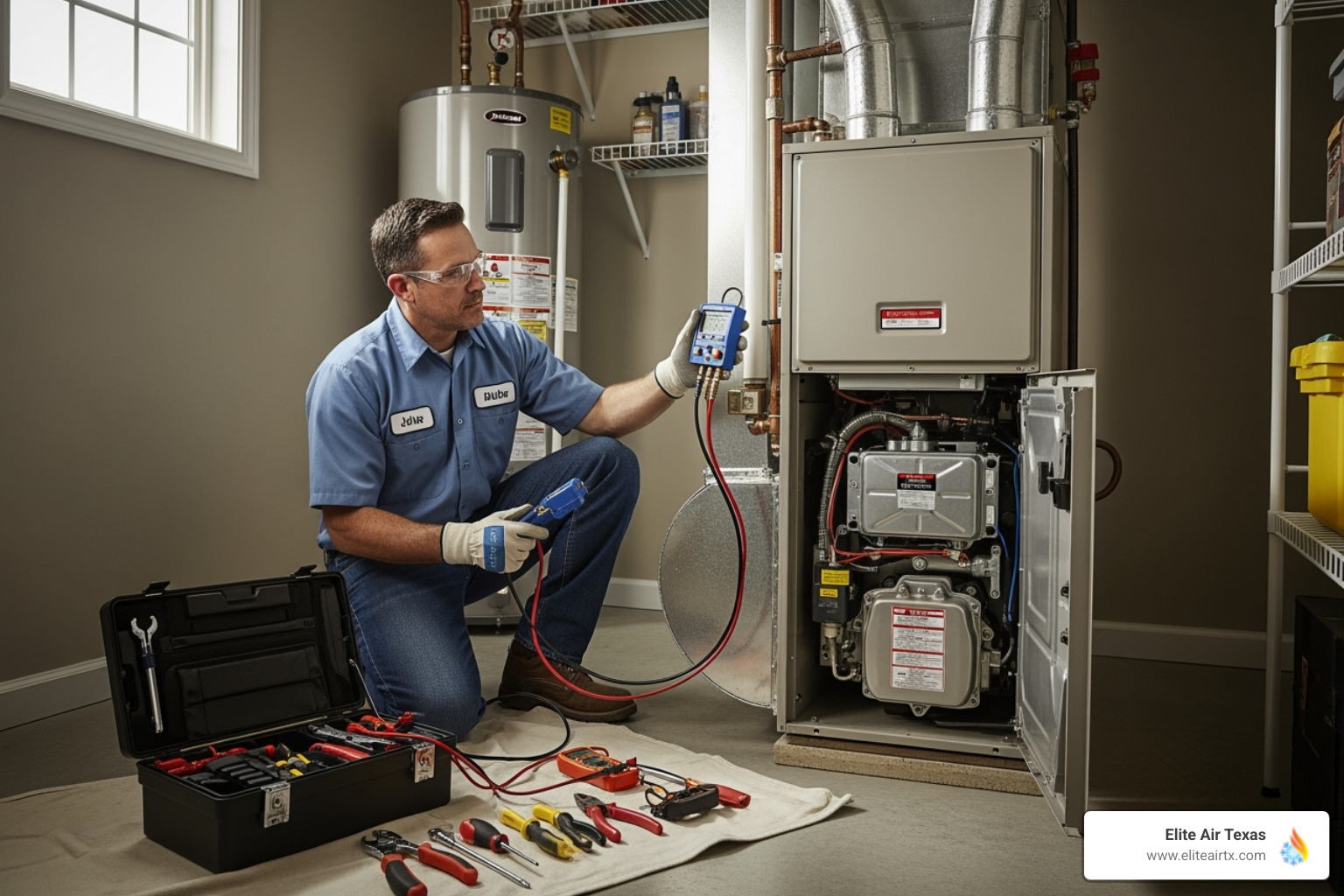
Why a Heating System Check Is Essential for Texas Homeowners
A heating system check is a thorough inspection of your home's heating equipment to ensure it operates safely, efficiently, and reliably throughout the winter season. With temperatures in Texas sometimes dropping unexpectedly, your heating system needs to be ready when you need it most.
Here's what a proper heating system check includes:
- Safety inspection - checking for gas leaks, carbon monoxide risks, and electrical hazards
- Efficiency testing - ensuring your system runs at peak performance to save energy
- Component examination - inspecting filters, thermostats, vents, and mechanical parts
- Professional tune-up - having an HVAC technician perform comprehensive maintenance
- Performance verification - testing system operation before cold weather arrives
As the weather gets colder, you'll likely start using your heating system more to stay cozy and warm. But before you rely on your heater to keep you comfortable all season, it's important to check if it's working properly.
About two-thirds of energy used in the average home goes to heating and cooling, making your HVAC system one of your home's most important - and expensive - components. A yearly check-up can prevent unexpected breakdowns, keep your family safe from hazards like carbon monoxide, and help your system run more efficiently.
Most heaters can last 15 to 20 years with proper care, but only if they're maintained regularly. When your heater runs efficiently, it uses less energy and costs less to operate, saving you money on utility bills while keeping your home comfortable.

Why a Yearly Heating System Check is Non-Negotiable
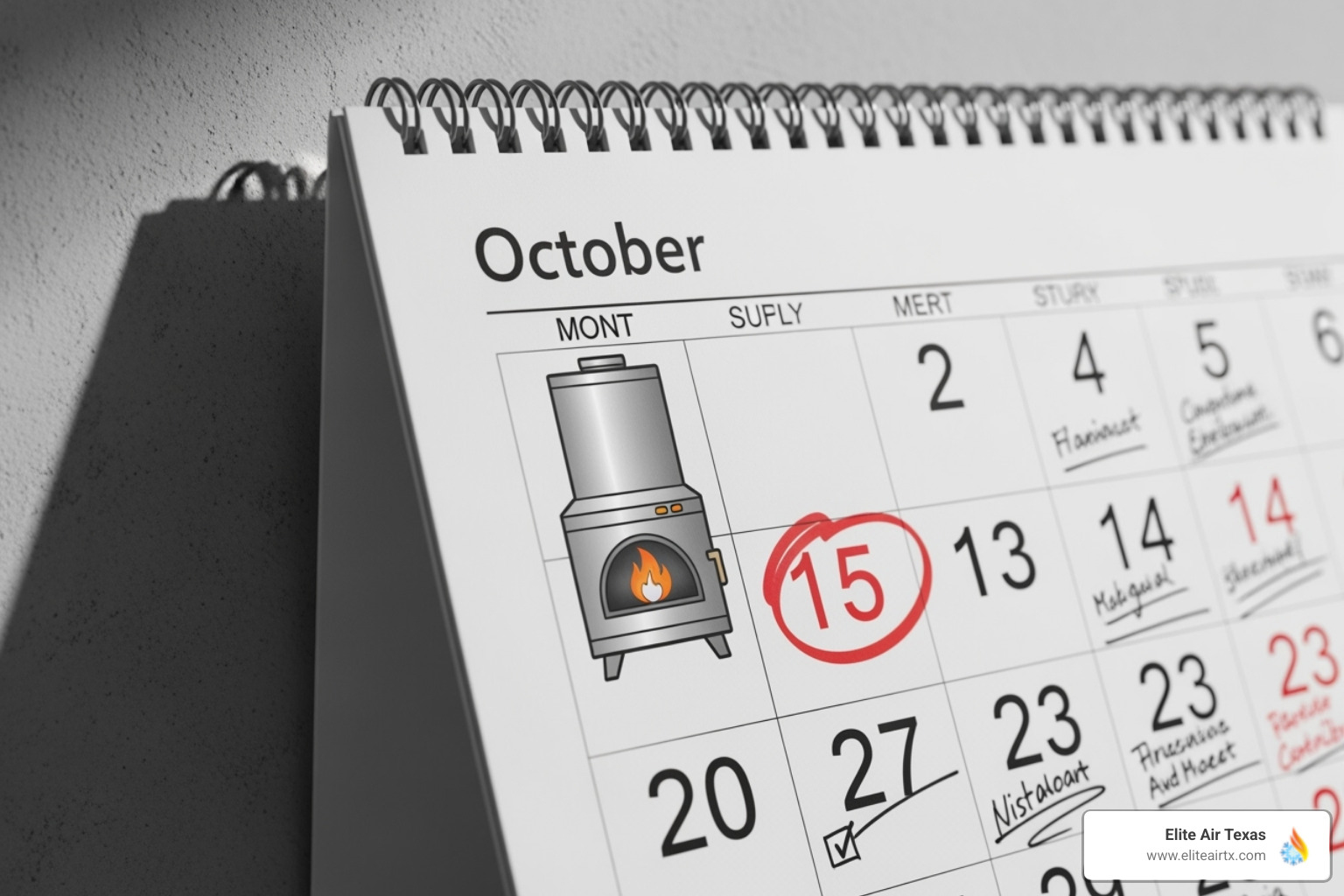
Let's be honest – when everything's working fine, it's easy to forget about your heating system. But here's the thing: a yearly heating system check isn't something you can skip and hope for the best. It's like brushing your teeth or changing the oil in your car – it might seem optional until something goes wrong, and then you really wish you'd kept up with it.
Think about it this way: your heating system is one of the hardest-working appliances in your home during the colder months. Even here in Texas, when those unexpected cold snaps hit, you want to know your heater will fire right up and keep your family comfortable. Most heaters last 15 to 20 years with proper care, but that "with proper care" part is key.
The benefits of annual maintenance go way beyond just making sure your system turns on when you need it. We're talking about lower energy bills, improved safety, and better air quality for your family. Did you know that airflow problems alone can reduce your system's efficiency by up to 15%? That's like throwing money out the window every month.
1. Ensures Safety and Prevents Hazards
Here's where things get serious. Your heating system deals with potentially dangerous stuff – gas, electricity, and combustion. When these components aren't properly maintained, they can create real hazards for your family.
Carbon monoxide is probably the scariest risk. This invisible, odorless gas can be deadly, and faulty heating equipment is one of the main sources in homes. During a professional heating system check, technicians specifically look for CO leaks and inspect your heat exchanger for cracks that could allow this dangerous gas into your living space.
Then there's gas leak detection. Natural gas and propane are generally safe when your system is working properly, but leaks can create serious fire hazards. Professional technicians have specialized equipment to detect even small leaks that you'd never notice on your own.
Electrical connections can also become loose over time, creating fire risks and causing your system to work inefficiently. A yearly inspection includes tightening these connections and checking for any worn wiring that could cause problems.
For more detailed safety information, check out the U.S. Department of Energy's guide on Furnaces and Boilers safety info.
2. Boosts Efficiency and Lowers Costs
Nobody likes opening their utility bill and seeing a number that makes them wince. A well-maintained heating system is your best defense against sky-high energy costs.
When your system is clean and properly adjusted, it doesn't have to work as hard to heat your home. Clean components mean better heat transfer, proper airflow means even heating throughout your house, and efficient operation means lower monthly bills.
Think of it like this: would you rather have a system that's struggling to push air through dirty filters and around dusty components, or one that's running smoothly with everything clean and properly lubricated? The difference shows up directly in your energy consumption and costs.
3. Extends Your System's Lifespan
Replacing a heating system is expensive – we're talking about a major home investment. The good news is that regular maintenance can help you get the most out of your current system.
Annual maintenance prevents major breakdowns by catching small issues before they turn into big, expensive problems. It reduces wear and tear on moving parts by keeping everything clean and properly lubricated. When technicians perform proactive repairs during routine maintenance, they're often fixing things that would have caused your system to fail completely if left alone.
Our Heating Maintenance in Dallas, TX services focus on these preventive measures that keep your system running reliably year after year.
Warranty protection is another big benefit that many homeowners don't realize. Most manufacturers require annual professional maintenance to keep your warranty valid. Skip the maintenance, and you might find yourself paying out of pocket for repairs that should have been covered.
Your yearly heating system check also improves your indoor air quality. Clean filters and components mean cleaner air circulating through your home, which is especially important for family members with allergies or respiratory issues.
Finally, there's the environmental impact. An efficient heating system uses less energy, which means a smaller carbon footprint for your household. It's a small way to do your part for the environment while saving money at the same time.
Your DIY Heating System Check: 5 Simple Steps for Homeowners
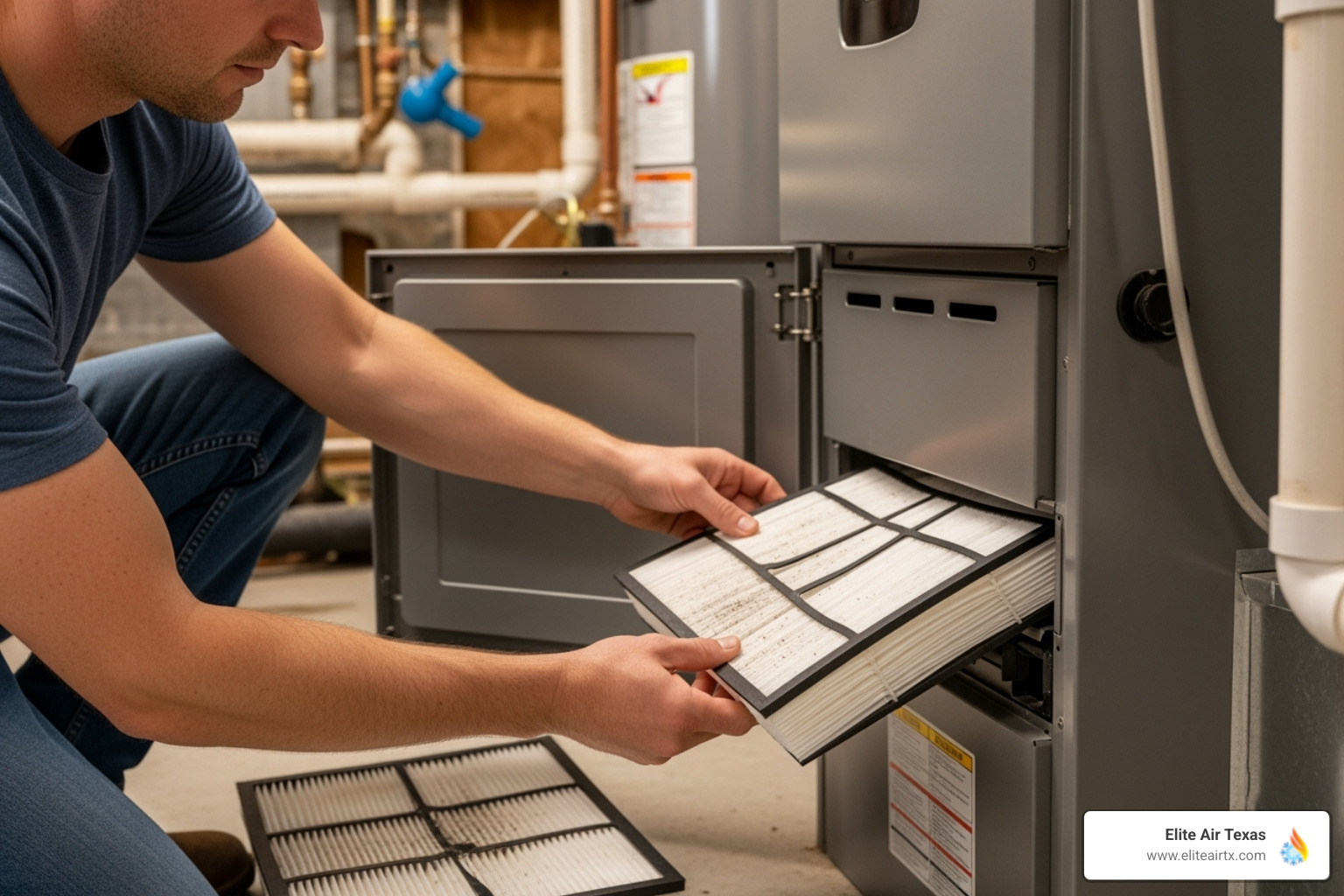
While we always recommend professional maintenance for your heating system, there's quite a bit you can do yourself to keep things running smoothly. Think of these DIY checks as your way of staying connected with your home's heating system – kind of like checking the oil in your car before a long road trip.
The best part? These simple tasks don't require any special tools or technical expertise. You're not trying to become an HVAC expert overnight, but rather learning to spot potential issues before they turn into expensive headaches.
The Importance of a DIY Heating System Check
Taking a few minutes to perform your own heating system check gives you real peace of mind. You'll catch simple problems early – like a dirty filter or a thermostat that needs new batteries – before they cause your system to work overtime or break down completely.
It's also empowering to understand how your heating system works. When you know what's normal and what isn't, you'll feel more confident about when to call a professional and when you can handle things yourself. Plus, there's something satisfying about solving a heating issue with a simple filter change instead of waiting for a service call.
1. Inspect and Replace Your Air Filter
Here's the golden rule of heating maintenance: check your air filter first. A clogged filter is like trying to breathe through a pillow – your system has to work much harder to push air through, and sometimes it just gives up.
When your filter gets too dirty, it restricts airflow so much that your heat exchanger can overheat and shut down automatically. That's why your house might feel cold even though your thermostat is calling for heat.
Most filters should be changed every three months, but if you have pets, allergies, or run your system frequently, you might need to change them more often. Some homeowners find monthly changes work better during heavy-use seasons. If you have a washable filter, just follow the manufacturer's cleaning instructions and make sure it's completely dry before putting it back.
For a comprehensive pre-winter tune-up that includes professional filter inspection, consider our Heating Tune-Up in Fort Worth, TX service.
2. Test Your Thermostat
Your thermostat is basically the brain of your heating system, so it's worth giving it a quick check-up. Start with the basics: make sure it's set to "heat" mode and that the temperature setting is actually higher than what it's reading for the current room temperature.
If your thermostat uses batteries, replace them now. Seriously – dying batteries are the number one reason thermostats stop working properly, and it's such an easy fix that it feels silly to call a technician for it.
Want to test if your thermostat is accurate? Place a separate thermometer next to it and compare the readings. If they're off by more than a few degrees, your thermostat might need calibration or replacement. Smart thermostats are becoming increasingly popular because they can learn your schedule and adjust temperatures automatically, potentially saving energy when you're not home.
3. Clear Vents and Registers
This step is so simple it almost feels too easy, but blocked vents are a surprisingly common problem. Walk through your house and check that furniture, rugs, curtains, or toys aren't covering your heating vents and return air registers.
When vents are blocked, warm air can't circulate properly, creating hot and cold spots throughout your home. Your heating system ends up working harder to compensate, which wastes energy and puts extra strain on the equipment.
While you're at it, give the vents a quick vacuum or wipe-down to remove dust buildup. Clean vents not only improve airflow but also help maintain better indoor air quality by reducing the amount of dust and debris circulating through your home.
What to Expect During a Professional Heating System Check
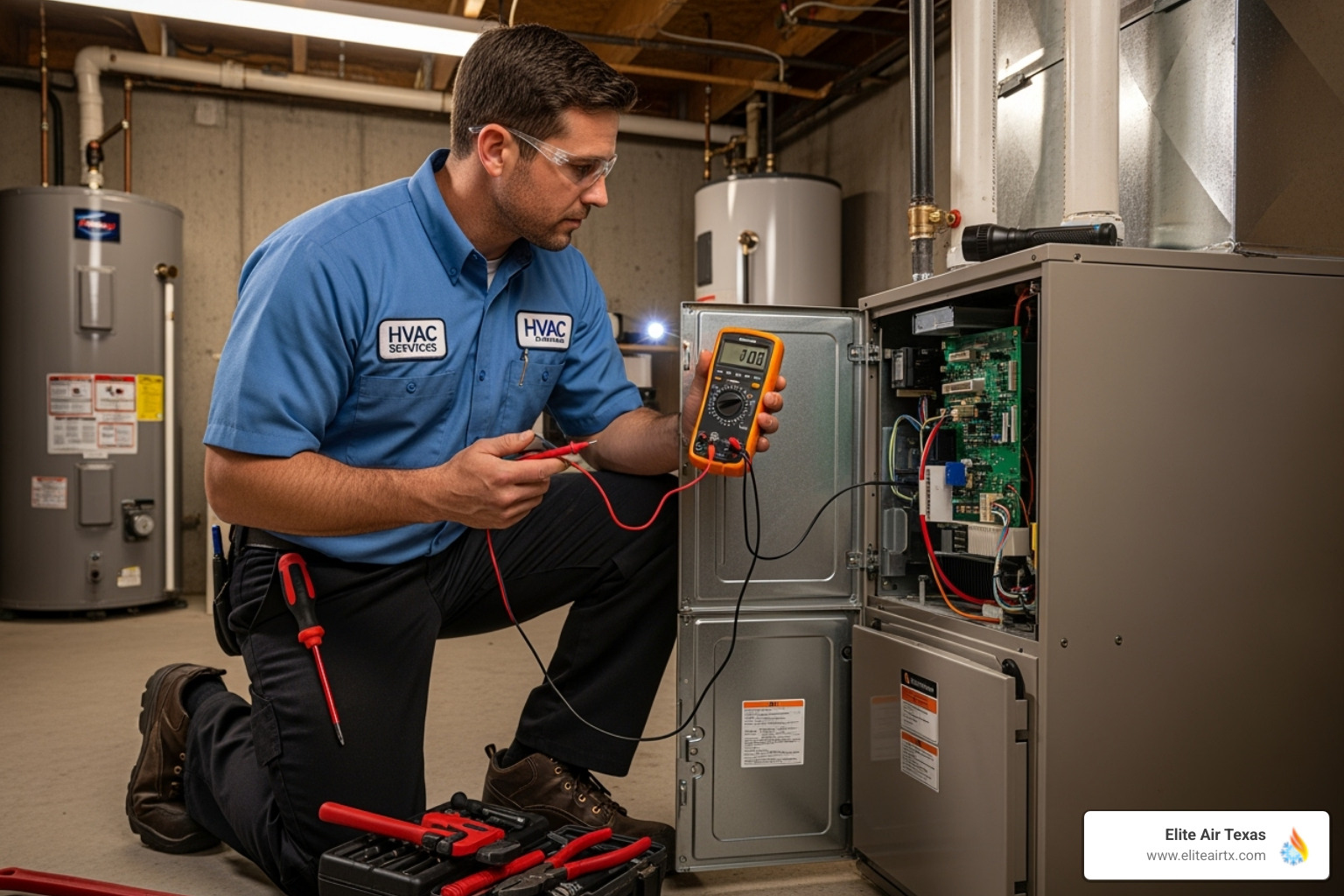
While your DIY checks are a great first step, there's nothing quite like having a professional take a look at your heating system. When you schedule a professional heating system check, you're getting the expertise of a trained technician who knows exactly what to look for and has the specialized tools to do the job right.
Think of it like the difference between checking your own pulse and getting a full physical from your doctor. Both have their place, but the professional exam catches things you might miss and gives you real peace of mind.
Key Components Inspected by a Professional
During a comprehensive maintenance visit, our technicians perform what we call a multi-point inspection. It's thorough, methodical, and designed to catch both current problems and potential issues before they become expensive headaches.
The heat exchanger inspection is one of the most critical parts of this process. This component is essentially the heart of your furnace, and if it develops cracks, it can leak dangerous carbon monoxide into your home. Our technicians carefully examine every inch to ensure it's in perfect condition.
We also perform a detailed burner combustion check to make sure your furnace is burning fuel efficiently and safely. This includes testing the gas pressure to ensure everything is operating within safe parameters. Improperly operating gas connections aren't just inefficient – they're a serious fire hazard.
Electrical connections get special attention too. Over time, these connections can loosen due to the heating and cooling cycles your system goes through. We tighten all connections and measure voltage and current on motors to prevent unsafe operation and extend the life of your equipment.
The blower components receive a thorough cleaning and adjustment. This is where a lot of dust and debris can accumulate, affecting both your system's efficiency and your indoor air quality. Clean blower components mean better airflow and less strain on your system.
We also check the condensate drain for clogs. You might not think much about this small component, but a blocked drain can cause water damage and even trigger safety switches that shut down your entire system unexpectedly.
Safety controls are tested to ensure your system responds correctly to commands and shuts down safely if any problems are detected. We also verify your thermostat settings are optimized for both comfort and energy savings.
All moving parts get proper lubrication to reduce friction and ensure quiet operation, while gas or oil connections are inspected for leaks and proper sealing.
Our Heating Maintenance in Arlington, TX services cover all these essential checks and more, giving you complete confidence in your system's performance.
How a Professional Tune-Up Improves Indoor Air Quality
Here's something many homeowners don't realize: your heating system plays a huge role in the quality of air you breathe every day. During a professional heating system check, we're not just making sure your system heats your home – we're also improving the air your family breathes.
When technicians clean components like the blower and coils, they're removing months of accumulated dust, dirt, and allergens that would otherwise get circulated throughout your home. It's amazing how much buildup can occur in these hidden areas, and getting them clean makes a noticeable difference in air quality.
The condensate drain inspection is particularly important for air quality. When this drain gets clogged, it creates the perfect environment for mold and mildew growth within your HVAC system. Once mold starts growing in your system, those spores get blown into every room of your house. By keeping the drain clear and the system clean, we're preventing this unhealthy situation before it starts.
For families dealing with allergies or asthma, this improvement in air quality can be life-changing. Less dust, fewer allergens, and cleaner air circulation mean everyone breathes easier and feels more comfortable in their own home.
5 Warning Signs Your Heater Needs Immediate Attention
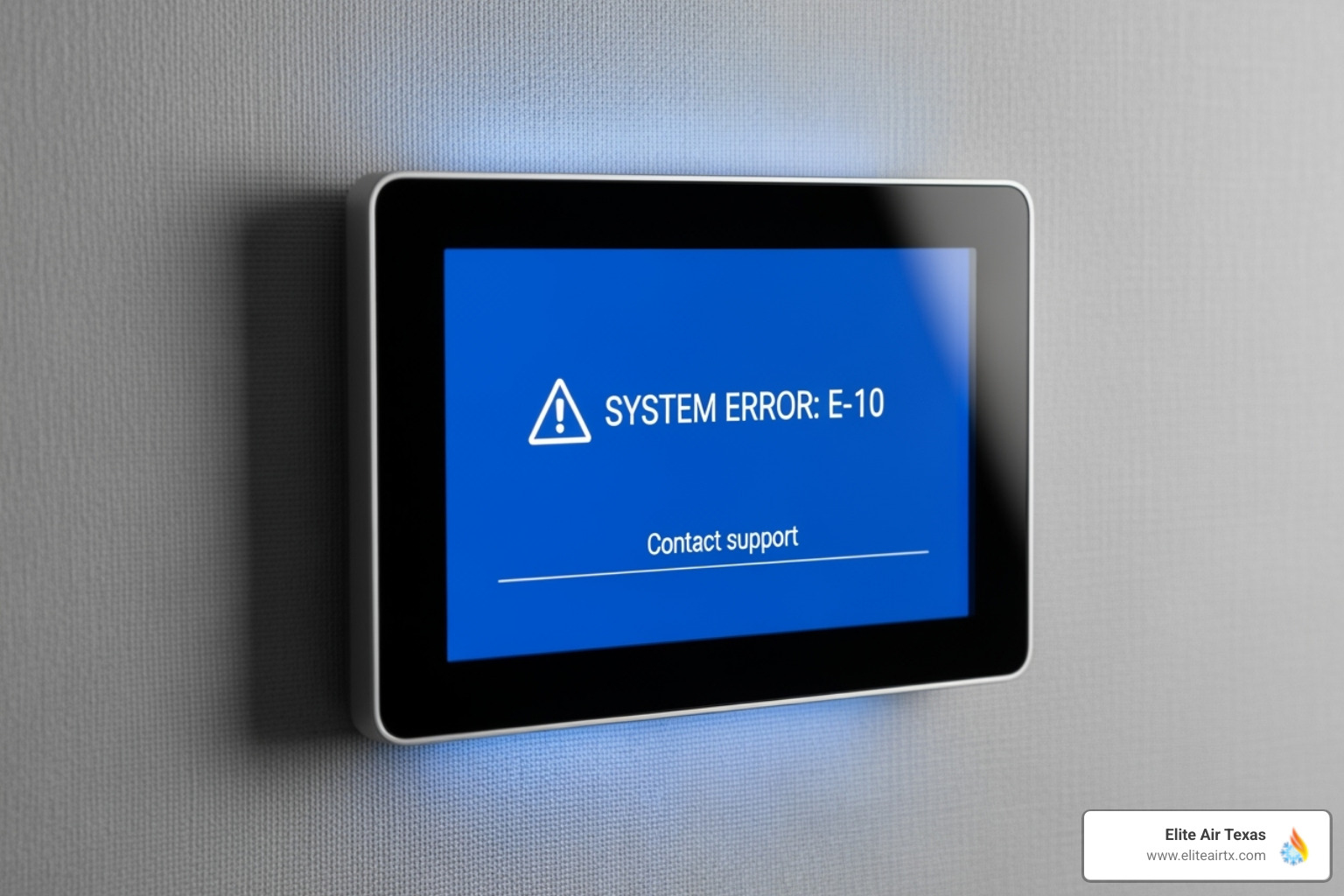
Even if you've been diligent about your yearly heating system check, sometimes your heater will give you clear signals that something's not right. Think of these warning signs as your heating system's way of asking for help before a small problem becomes a big, expensive headache.
Ignoring these red flags is like ignoring that weird noise your car makes – it might keep running for a while, but eventually, you'll find yourself stranded on the side of the road. Except with your heater, you'll find yourself shivering in your own home while waiting for emergency repairs.
Here are the most important warning signs that your heater needs professional attention right away:
1. Unusual Noises or Smells
Your heating system should run quietly in the background, like a well-behaved houseguest. When it starts making a racket or creating unpleasant odors, it's definitely trying to tell you something.
Strange noises can reveal a lot about what's happening inside your system. Banging or rattling sounds often mean something has come loose – maybe a panel, a screw, or even a component in your ductwork. Grinding or squealing noises usually point to motor problems, like worn bearings that need lubrication or replacement. And if you hear loud clanking, that's often your blower fan telling you it's having serious mechanical issues.
Unusual smells are even more concerning than strange sounds. A light dusty smell when you first fire up your heater for the season is totally normal – that's just dust burning off components that haven't been used in months. But other odors require immediate attention.
A burning smell that persists, especially if it smells like melting plastic or electrical wiring, signals a dangerous electrical problem. Turn off your system and call for help immediately.
The rotten egg or sulfur smell is the most serious of all – that's the distinctive odor added to natural gas to help you detect leaks. If you smell this, don't hesitate: turn off your system, get everyone out of the house, and call both your gas company and an HVAC professional right away.
A musty or moldy smell suggests moisture problems and possible mold growth in your ductwork, which affects your indoor air quality and your family's health.
2. Inconsistent Heating or Airflow
Nothing's more frustrating than walking from a toasty living room into an arctic bedroom. If your home feels like it has different climate zones, or if you're barely feeling any air coming from your vents, your heating system isn't doing its job properly.
Weak airflow from vents often indicates clogged filters, blocked ducts, or problems with your blower motor. Cold spots throughout your house suggest your system can't distribute heat evenly, which could be due to duct leaks, an undersized system, or failing components.
Pay attention to how often your system runs, too. A heater that constantly runs but never reaches your desired temperature is working way too hard, wasting energy and wearing itself out. On the flip side, a system that cycles on and off frequently (called short cycling) isn't running long enough to heat your home effectively.
Our Heating Tune-Up in Aledo, TX service can help diagnose these frustrating heating inconsistencies and get your comfort back on track.
Other critical warning signs include spiking energy bills without any change in your usage patterns – this usually means your system is losing efficiency and struggling to keep up. If you have a gas furnace, watch your pilot light: it should burn with a steady blue flame, not yellow or orange, and it shouldn't keep going out.
Frequently tripped circuit breakers are your electrical system's way of protecting you from a heating system that's drawing too much power or experiencing electrical faults.
When you notice any of these warning signs, start with simple troubleshooting: check your thermostat settings, replace the batteries, make sure the power switch is on, and verify your circuit breaker hasn't tripped. But if these basic steps don't solve the problem – or if you detect any gas or burning smells – contact a professional HVAC technician immediately. Your safety and comfort are worth far more than the cost of a service call.
Frequently Asked Questions about Heating System Checks
We get a lot of questions from Texas homeowners about heating system checks, and honestly, we love answering them! It shows that people care about keeping their homes safe and comfortable. Here are the most common questions we hear, along with our straightforward answers.
How often should I get my heating system checked?
Here's the golden rule: once a year, every year. We recommend scheduling your professional heating system check in the fall, ideally before you actually need to fire up your heater for the season. Think of it like getting your flu shot before flu season starts - it's all about being prepared!
Fall timing is perfect because you'll catch any issues that developed over the summer when your system was taking a well-deserved break. Plus, HVAC technicians tend to be less busy in fall compared to the dead of winter when everyone's heater decides to quit at the same time. You'll get better availability and won't be left shivering while waiting for service.
Can I perform a heating system check myself?
The short answer is: some parts, yes - other parts, absolutely not.
You can definitely handle the basics that we covered earlier in this article. Changing your air filter is probably the most important thing you can do yourself, and it takes just a few minutes. Testing your thermostat and clearing vents and registers are also perfect DIY tasks that don't require any special tools or expertise.
But here's where we draw the line: anything involving electrical connections, gas lines, or mechanical components needs a trained professional. We're talking about your family's safety here. Gas leaks, carbon monoxide issues, and electrical problems aren't worth the risk of DIY troubleshooting. Leave the complex stuff to us - that's what we're here for!
What is the biggest benefit of regular heating maintenance?
If we had to pick just one benefit, it would be safety - hands down. Nothing is more important than protecting your family from hazards like carbon monoxide leaks or gas issues. These problems can be literally life-threatening, and they're often invisible until it's too late.
But honestly, the benefits work together like a team. When we catch safety issues early, we're also improving your system's efficiency, which means lower energy bills for you. At the same time, we're helping your equipment last longer - and considering that a good heating system is a significant investment, extending its lifespan protects your wallet too.
It's like taking care of your car - regular oil changes prevent engine problems, improve gas mileage, and help your car last longer. Your heating system deserves the same attention, especially when it's working hard to keep your Texas home comfortable during those surprisingly chilly winter nights.
Stay Warm and Safe This Winter
Winter weather in Texas can be unpredictable, and the last thing you want is to find your heating system isn't working when temperatures drop unexpectedly. As we've explored throughout this guide, a yearly heating system check isn't just recommended maintenance – it's your best defense against cold nights, high energy bills, and potentially dangerous situations.
Proactive maintenance is always better than reactive repairs. When you stay ahead of potential problems with regular check-ups, you're protecting your family's comfort and safety while also protecting your wallet from costly emergency repairs. Think of it this way: would you rather spend a little time and money on preventive care now, or deal with a complete system breakdown on the coldest night of the year?
The benefits we've discussed – from ensuring your family's safety by preventing carbon monoxide leaks to extending your system's lifespan and keeping your energy bills manageable – all come down to one simple action: don't wait for a breakdown to happen.
At Elite Air Texas, we understand that your home's comfort is about more than just temperature control. It's about creating a safe, cozy environment where your family can thrive, no matter what Mother Nature throws your way. We're committed to providing affordable comfort and elite service to homeowners throughout Aledo, Fort Worth, Dallas, and the surrounding Texas areas, including Benbrook, Weatherford, Granbury, and Mineral Wells.
Our expertise means your peace of mind. When you choose us for your heating system maintenance, you're not just getting a service call – you're getting a team that stands behind their work with a 10-year labor warranty. We believe in doing the job right the first time, every time.
Don't let another winter catch you unprepared. Your heating system has been working hard to keep you comfortable, and it deserves the same care and attention you'd give any important investment in your home.
Take action today and ensure your family stays warm and safe all season long. Schedule Your Heat Pump Service in Fort Worth, TX and experience the Elite Air Texas difference for yourself.
Ready to Enhance Your Comfort?
Contact our experts today to discover tailored HVAC solutions that fit your needs perfectly.


%201.svg)

